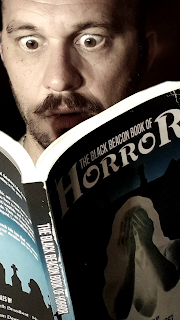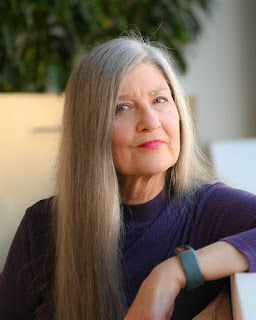Hello there, avid reader. You've read part one of the Fortitude and Courage announcement and you're back for the next round of steampunk tennis between Karen Bayly and Cameron Trost. Glad you could make it. Just give us a minute to warm up a little first... Okay, are you ready, Karen? Great! Let's play!
C: What is your writing process like? Are you more of a plotter or a pantser?
K: I do a basic plot, so I know what plot points to hit to reach the end. After that, I’m a pantser. If I were to plot every little thing, I would never write a novel. I can get too tied up in the details and end up strangling the story. I also find that within the plot, the interaction of the characters drives some aspects of the story. Artemis and Nathaniel are the perfect examples. How they end up is not what I planned.
K: What’s your editing process?
C: I get the book formatted the way I want it first so that it’s print-ready, then I do a quick edit on the laptop, fixing up typos, punctuation mistakes, and aiming for consistency. The idea is to remove simple errors that will distract me from diving into the book. Once it looks fairly clean, I order a print copy, grab a red pen, and make myself comfortable so I can scribble away, adding notes and scratching out words or entire sentences that need to be removed or rewritten. The final step in editing an anthology is usually adding the page numbers, because this is what inevitably changes until everything is in the right place, and no editor wants a reader to point out that the story supposed to start on page twenty-seven actually starts on page twenty-eight!
C: What do you need in your writing space to help you stay focused?
K: Quiet.
K: What keeps you focused on editing?
C: Quiet or music of my choosing. I love editing, so as long as I have no external distractions or disturbances, I’m in the zone.
C: How do you celebrate when you finish your book?
K: I don’t! I probably should. I’m partial to good peaty whisky. And champagne. Or a fine red wine.
K: How do you celebrate when you publish a book?
C: By plastering posts all over social media! Then the peaty whisky. ;)
C: What is your kryptonite as a writer?
K: Self-doubt. It can be crippling.
K: What frustrates Black Beacon Books as a publisher?
C: What annoys me is when I receive a submission from an author and it’s immediately clear the guidelines haven’t been followed. It’s rude and it dramatically reduces your chances of getting an acceptance. But more than that, what really frustrates me is not selling hundreds of books each week—or even each month! We publish books for people to read, and we want as many readers as we can get!
C: Are you active on social media? How do you use it?
K: I’m relatively active. I share upcoming publications and posts from valued authors and publishers. When I have a long enough lead time, I share my writing process for a story and snippets of what inspired me.
K: What’s your social media strategy?
C: I try to repeat what I notice works and I try to post regularly with the aim of making our loyal fans feel appreciated while at the same time reaching new potential fans. I lean more heavily towards Facebook and Instagram, because they seem to work, and I promote Goodreads page as it’s a book-specific platform. We’re still on Twitter for the moment but it looks like Bluesky might be slowly gaining ground. There’s no big strategy. The idea is to have fun and include others in our adventure. We publish a lot of dark fiction but I try to keep our social media interactions positive and engaging. That’s what readers seem to want.
C: Do you play music while you write—and, if so, what’s your favourite?
K: No, I find music distracting as I tend to listen to it rather than write. The exception is Philip Glass’s Tirol Concerto for Piano and Orchestra 2nd Movement, which always evoked a strong sense of the Fortitudo and Nathaniel and Artemis’s troubled relationship.
K: What does Black Beacon Books need to get down to the business of publishing?
C: I guess this question can be understood a number of ways. Keeping in mind that Black Beacon Books is essentially me—Cameron Trost—running the show from my cottage in Brittany in my free time. At the nuts-and-bolts level, I need time alone to run things—that includes keeping the website and social media platforms updated, reading submissions, editing and formatting books, choosing cover artists or designing covers in-house, and much more. Beyond my laptop, however, Black Beacon Books becomes a team effort. Our aim is to sell copies so we can keep publishing more books, and we need our contributing authors to help us. We expect them to play an active role in promoting our titles so that we can succeed together.
C: What books did you grow up reading?
K: The classics – Dickens, Austen, the Brontes, Lewis Carrol, Kenneth Grahame, lots of horse stories (!), fairy tales (I have an excellent book of fairy tales which is over 80 years old and passed down from my mother), and Greek and Norse mythology. I moved into science fiction and horror in my teens – starting with “The Chrysalids”, which we read in the first year of high school and progressing to the Pan Books of Horror. There are still stories from that series that haunt me - The Copper Bowl, The Emissary, Man Skin {shiver}.
K: What books have influenced Black Beacon Books in the development of its catalogue?
C: A tough question. None specifically and countless books more generally. Our anthologies are designed to intrigue, entertain, and thrill. If you take the Pan Books of Horror and mash them up with the Alfred Hitchcock anthologies, you’ll get an idea of the foundations we’re built on.
C: Have you ever tried to write a novel for a genre you rarely or never read?
K: I haven’t written whole novels, but I’ve written short stories in genres I rarely read. Apparently, I can write decent romance and erotica, which is weird because I have zero interest in either. However, people like that stuff, so I work elements of both into my novels when appropriate.
K: What genres would you never publish?
C: It’s important to think about brand—I know, uncool business concept as opposed to cool artist term, but it’s not going to help us if we spread ourselves too thin. Our bread and butter—well, we’re stilling working on the butter—is suspenseful fiction and all the genres it encompasses. While a hint of romance and a dash of eroticism can spice up a gripping tale, we’re not interested in giving Mills & Boon (they still around?) a run for their money, and “50 Grades of Shay”...well, no comment. We’re not planning on branching out into high fantasy or hard sci-fi either.
C: What book (or books) are you currently reading?
K: This changes every five days or so, so it will be outdated by the time anyone reads this. I’ve just finished Dervla McTiernan’s “The Murder Rule” and am now reading Sylvain Neuvel’s “A History of What Comes Next”.
K: What are the top five books in your To Be Read list?
C: I have two lists of books to read; one mostly made up of print books I’ve ordered (living in rural Brittany means my books in English are ordered online) and the other made up of ebooks I’ve been asked to review by fellow authors. Of the latter, my priorities are reviewing “A Vindication of Monsters”, edited by Claire Fitzpatrick, and “Cretaceous Canyon” by Deborah Sheldon. Of the former, well, I’m currently reading “Charlotte Sometimes” by Penelope Farmer, which is the book one of my favourite songs is based on, then there’s “Consider Her Ways and Others” by John Wyndham, “L’Affaire Saint-Fiacre” by Georges Simenon, “The Last Man” by Mary Shelley, and short stories by M.R. James, Ian Rankin, and Val McDermid. Of course, most of my time is spent reading submissions and editing our future publications.
C: What’s the trickiest thing about writing characters of the opposite gender?
K: Making my male characters appealing to men! I don’t think I write the type of men that men are impressed by. However, one of my more geeky characters has proved popular with male readers.
K: Do your publications appeal to all genders, or do you find your sales are skewed?
C: We have no way of knowing the gender of people buying our books, but our typical social media follower is a female in her forties. Since women are known to be far more discerning than men, I take this as a huge thumbs-up. The question remains, is it the quality of our books they love, or the sexiness of the man publishing then...one likes to think a little from column A and a little from column B! ;) A terrible sense of humour is sexy, right? (K: Umm…) In any case, we aim to please readers regardless of race, gender, or sexual orientation. All you need to love our books is fantastic taste!
C: What do the words “literary success” mean to you? How do you picture it?
K: When I first started writing, it meant being well-known by readers, well-regarded by peers, and making a living from my work. Nowadays, I consider myself a literary success if I get paid for something I’ve written. That’s not meant to sound like I’m devaluing my writing. But it is tough to get noticed, so adjusting your expectations helps you stay hopeful as you inch your way up the literary ladder.
K: What are Black Beacon Books’ ambitions for the future?
C: Our modest ambition is to keep putting out a handful of books per year, gain new readers every month, and keep breaking even. Let’s be more ambitious now so you have an exciting answer to your question—I’d say, somewhere between breaking even and eating a Penguin burger. I’d love to do this full-time and be able to pay our contributing authors and cover artists a better rate. That would be great. We’re a talented bunch who deserves to live from our passion and receive shiploads of letters and underwear from fans and stalkers. Not there just yet. NB. Clean underwear only, please!
K: No underwear from fans or stalkers for me. Just putting that out there.
C: Who has been the biggest supporter of your writing?
K: Me. And a handful of friends (they know who they are).
K: What is the biggest difficulty you face as an indie publisher?
C: Getting people to put their money where their mouths are and buy our books. As simple as that. Do it! ;)
C: Would you share something about yourself that your readers don’t know yet?
K: I used to be an actor and a musician.
K: And would you share something about yourself that your readers don’t know yet?
C: No. Oops, I mean—yes, of course! Well, I’m not sure we have any dark secrets beyond the ones in our books, but readers may not be aware that Halloween 2023 marks our tenth anniversary as a publisher, and this means that there will be plenty of celebrations taking place as we head into the month of October. In fact, they’ve already kicked off! Follow us all over the interwebs: linktr.ee/blackbeaconbooks
More news coming soon, including the cover reveals! In the meantime, you can find Karen online here: https://karenbayly.com







